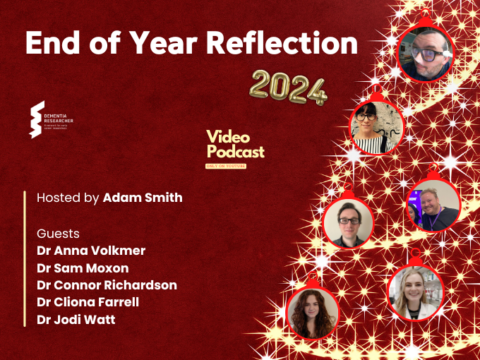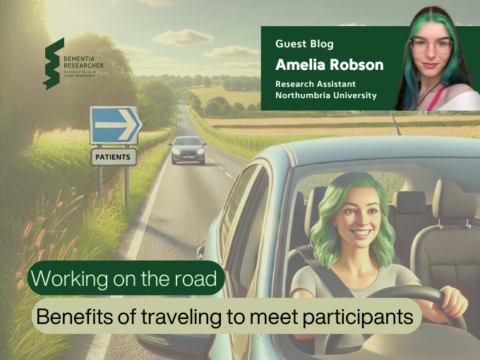Hi everyone and welcome to my first blog post for NIHR Dementia Researcher. This will hopefully be the first of monthly blogs on my experience as a dementia researcher, after having a great time as a guest on the dementia researcher podcast over the summer during the Alzheimer’s Association International Conference (AAIC) in San Diego. I wanted my first blog to be a somewhat personal introduction to who I am and how I got into dementia research, followed by a second blog all about my research.
My name is Connor Richardson, I am 30 years old and I am an Epidemiologist at Newcastle University Population Health Sciences Institute. I like to think of myself as an all-round academic, my main research interests are in population level epidemiology of dementia. I primarily work on the large, multi-centre Cognitive Function and Ageing Studies (CFAS) with professors Fiona Matthews at Newcastle and Carol Brayne in Cambridge, among many others; I am particularly interested in modelling dementia risk in population representative neuropathology cohorts and experimenting with machine learning.
I am also very involved with wider university life I teach or have taught a number of lectures on ageing and dementia research, chronic disease epidemiology and quantitative research methods. I also supervise undergraduate and postgraduate students at Newcastle University and Cambridge.
Over the past years I have become very involved in Equality, Diversity and Inclusion (EDI), becoming deputy lead of EDI in our research institute at Newcastle. In this role I work with colleagues to influence the structure and running of the institute to be more inclusive to those with protected characteristics, promote equality and diversity throughout the institute by organising events and promoting research related to EDI. This is something I hope to discuss much more in this blog, especially around my experience of fitting this role into research life as an ECR.
I’m a born and bred Geordie! And there are not as many of us at Newcastle University as you might think! I grew up in a small ex-mining town in Northumberland called Ashington, the towns claim to fame is that it used to be the biggest mining village in the world.
Science was always my passion, from a young age I perused a career in medicine.
I gave up on medicine as my predicted A level results weren’t good enough, which now I am very grateful for as I would have made the world’s worst doctor! I refocused on Biomedical Sciences applying to Newcastle University through their PARTNERS programme, a summer school for local areas low representation in universities. The summer school had a big impact on me highlighting issues that affect those from working class backgrounds in academia, something I now try to make a difference with through my work in EDI.
I graduated in 2013 and although I loved my time and was still very interested in science and research I fell out of love with working in labs. I had two opposing experiences, one awful summer placement in a lab and one brilliant experience in bio imaging as my dissertation. I think the awful experience won the day and put me off for good.
I left University feeling a bit lost. In the end I made a decision which made total science to a 21 year old Connor and moved to London, with no money, job or direction. It actually turned out to be an amazing time, and probably the first time I felt like I had no pressure to achieve academically. One thing my time in London did give me was space to think about what I wanted to do. I realised I was still interested in science and research but I was more interested in health than biology.
I decided to go back to Newcastle University to do an MSc in Public Health and Health Policy Research. During my MSc I realised how much I enjoyed epidemiology and biostatistics. I had always been interested in ageing, neuroscience and cognition so knew I wanted to do a dissertation project on dementia with a hope of getting a PhD after; so I asked around for a project superior and found Blossom Stephan. Bloss supervised my dissertation into measuring cognitive reserve in the Newcastle 85+ study, she also supported me in applying for a PhD to study Mild Cognitive Impairment (MCI) in CFAS working with her and Fiona Matthews.
I started my PhD in 2015 which began my 7 years working with Fiona Matthews, I went straight into a post-doc position working with her on a range of studies including experimental RCT designs, dementia neuropathology and the impact of COVID-19 on older people’s mental health. Which more or less describes where I am now. Outside of research I recently bought a house in Newcastle and filled it with 2 tiny dogs, Bailey (3) and Lyra (1), very cute Pomeranian – Toy Poodle crosses or Pomapoo’s. I love reading and gaming in my spare time, recently I joined an LGBT running club, Newcastle Frontrunners.
And that is pretty much me. I hope you enjoyed this introduction to myself and what I do and I hope you enjoy my upcoming blogs!

Dr Connor Richardson
Author
Dr Connor Richardson is a Neuro-epidemiology Research Associate in the Newcastle University Population Health Sciences Institute. Connor is the research statistician for the Cognitive Function and Ageing studies (CFAS) multi-centre population cohort. His research interest lies in using advanced statistical modelling and machine learning to measure dementia risk. Connor blogs about his research, Equality, Diversity and Inclusion and sometimes his Pomapoo’s.

 Print This Post
Print This Post





